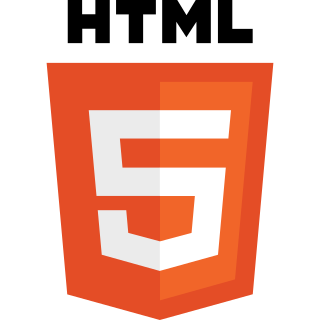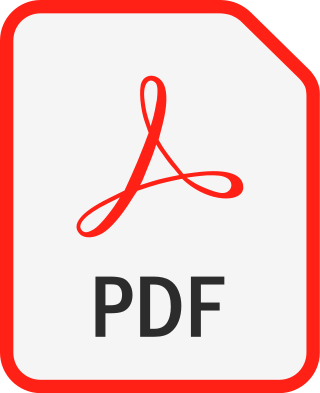
Hypertext Markup Language (HTML) is the standard markup language for documents designed to be displayed in a web browser. It defines the content and structure of web content. It is often assisted by technologies such as Cascading Style Sheets (CSS) and scripting languages such as JavaScript.

LaTeX is a software system for typesetting documents. LaTeX markup describes the content and layout of the document, as opposed to the formatted text found in WYSIWYG word processors like Microsoft Word, LibreOffice Writer and Apple Pages. The writer uses markup tagging conventions to define the general structure of a document, to stylise text throughout a document, and to add citations and cross-references. A TeX distribution such as TeX Live or MiKTeX is used to produce an output file suitable for printing or digital distribution.

Microsoft Word is a word processor program developed by Microsoft. It was first released on October 25, 1983, under the name Multi-Tool Word for Xenix systems. Subsequent versions were later written for several other platforms including: IBM PCs running DOS (1983), Apple Macintosh running the Classic Mac OS (1985), AT&T UNIX PC (1985), Atari ST (1988), OS/2 (1989), Microsoft Windows (1989), SCO Unix (1990), macOS (2001), Web browsers (2010), iOS (2014) and Android (2015).

Portable Document Format (PDF), standardized as ISO 32000, is a file format developed by Adobe in 1992 to present documents, including text formatting and images, in a manner independent of application software, hardware, and operating systems. Based on the PostScript language, each PDF file encapsulates a complete description of a fixed-layout flat document, including the text, fonts, vector graphics, raster images and other information needed to display it. PDF has its roots in "The Camelot Project" initiated by Adobe co-founder John Warnock in 1991. PDF was standardized as ISO 32000 in 2008. The last edition as ISO 32000-2:2020 was published in December 2020.
The Rich Text Format is a proprietary document file format with published specification developed by Microsoft Corporation from 1987 until 2008 for cross-platform document interchange with Microsoft products. Prior to 2008, Microsoft published updated specifications for RTF with major revisions of Microsoft Word and Office versions.
DocBook is a semantic markup language for technical documentation. It was originally intended for writing technical documents related to computer hardware and software, but it can be used for any other sort of documentation.
AmigaGuide is a hypertext document file format designed for the Amiga. Files are stored in ASCII so it is possible to read and edit a file without the need for special software.
A lightweight markup language (LML), also termed a simple or humane markup language, is a markup language with simple, unobtrusive syntax. It is designed to be easy to write using any generic text editor and easy to read in its raw form. Lightweight markup languages are used in applications where it may be necessary to read the raw document as well as the final rendered output.

Pages is a word processor developed by Apple Inc. It is part of the iWork productivity suite and runs on the macOS, iPadOS, and iOS operating systems. It is also available on iCloud on the web. The first version of Pages was released in February 2005. Pages is marketed by Apple as an easy-to-use application that allows users to quickly create documents on their devices. Many Apple-designed templates comprising different themes are included with Pages.
Microsoft WinHelp is a proprietary format for online help files that can be displayed by the Microsoft Help browser winhelp.exe or winhlp32.exe. The file format is based on Rich Text Format (RTF). It remained a popular Help platform from Windows 3.0 through Windows XP. WinHelp was removed in Windows Vista purportedly to discourage software developers from using the obsolete format and encourage use of newer help formats. Support for WinHelp files would eventually be removed entirely in Windows 10.

Markdown is a lightweight markup language for creating formatted text using a plain-text editor. John Gruber created Markdown in 2004 as an easy-to-read markup language. Markdown is widely used for blogging and instant messaging, and also used elsewhere in online forums, collaborative software, documentation pages, and readme files.
PDF/UA, formally ISO 14289, is an International Organization for Standardization (ISO) standard for accessible PDF technology. A technical specification intended for developers implementing PDF writing and processing software, PDF/UA provides definitive terms and requirements for accessibility in PDF documents and applications. For those equipped with appropriate software, conformance with PDF/UA ensures accessibility for people with disabilities who use assistive technology such as screen readers, screen magnifiers, joysticks and other technologies to navigate and read electronic content.
Information Presentation Facility (IPF) is a system for presenting online help and hypertext on IBM OS/2 systems. IPF also refers to the markup language that is used to create IPF content. The IPF language has its origins in BookMaster and Generalized Markup Language developed by IBM. The IPF language is very similar to the well-known HTML language, version 3.0, with a range of additional possibilities. Therefore, a trained user may use virtually any word processor when creating IPF documents. The IPF language consists of 45 basic commands.
Enterprise search is software technology for searching data sources internal to a company, typically intranet and database content. The search is generally offered only to users internal to the company. Enterprise search can be contrasted with web search, which applies search technology to documents on the open web, and desktop search, which applies search technology to the content on a single computer.
The following is a comparison of e-book formats used to create and publish e-books.

Okular is a multiplatform document viewer developed by the KDE community and based on Qt and KDE Frameworks libraries. It is distributed as part of the KDE Applications bundle. Its origins are from KPDF and it replaces KPDF, KGhostView, KFax, KFaxview and KDVI in KDE 4. Its functionality can be embedded in other applications.

STDU Viewer is computer software, a compact viewer for many computer file formats: Portable Document Format (PDF), World Wide Fund for Nature (WWF), DjVu, comic book archive, FB2, ePUB, XML Paper Specification (XPS), Text Compression for Reader (TCR), Mobipocket (MOBI), AZW, multi-page TIFF, text file (TXT), PalmDoc (PDB), Windows Metafile (EMF), Windows Metafile (WMF), bitmap (BMP), Graphics Interchange Format (GIF), JPEG-JPG, Portable Network Graphics (PNG), Photoshop Document (PSD), PiCture eXchange (PCX-DCX). It works under Microsoft Windows, and is free for non-commercial use.

Google Docs is an online word processor and part of the free, web-based Google Docs Editors suite offered by Google. Google Docs is accessible via an internet browser as a web-based application and is also available as a mobile app on Android and iOS and as a desktop application on Google's ChromeOS.
The Z80 Operating System with Relocatable Modules and I/O Management (Z80-RIO) is a general-purpose operating system developed by Zilog in the late 1970s for various computer systems including the Z80 Micro Computer System (MCZ-1) series and the Z80 Development System (ZDS). The MCZ systems were primarily used for software development and automation solutions. RIO was designed to facilitate the development and integration of user's programs into a production environment.







